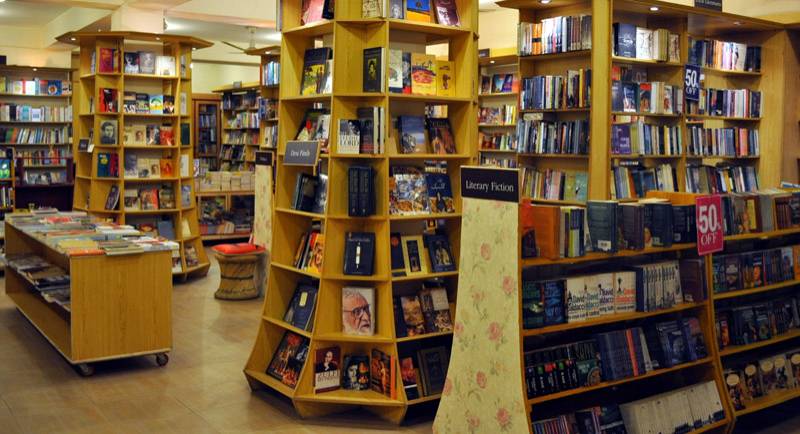
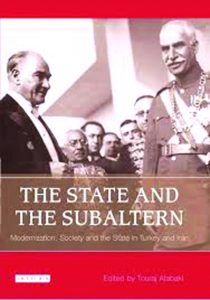
The State and the Subaltern: Authoritarian Modernisation in Turkey and Iran
Touraj Atabaki
I.B.Tauris (2007)
This is the first study to observe the practice of modernization in Turkey and Iran not only from above, by examining the measures adopted by the political regimes of the late Ottomans, Atatürk and Reza Shah, but also from below, exploring how different social levels contributed to the drive for modernity. It is a full and thorough analysis of how these societies reacted to reform and change.
The State and the Subaltern offers a fresh perspective on the accommodation and resistance to modernization and the relation between the common people and the state in two Islamic societies during the 19th and early 20th centuries. It is a fascinating exploration of the history of subalterns - the rank and file of society - with specific reference to gender, ethnicity, industrial and non-industrial urban labour, rural labour, unemployment and the impact of immigrant labour.
Touraj Atabaki is Professor of Oriental Studies at the University of Utrecht and Professor of the Social History of the Middle East at the International Institute of Social History, Amsterdam.
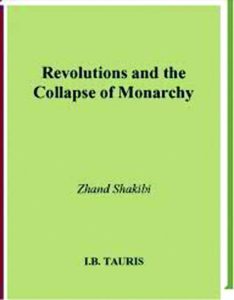
Revolutions and the collapse of monarchy
Zhand Shakibi
IB Tauris
What caused revolution among the last major monarchies of the modern period? Why were Louis XVI, Nicholas II and Mohammad Reza Pahlavi all overthrown and was this the result of their historical background or individual action? This powerful and original book is the first comparative study of the implosion of the monarchical regimes in Bourbon France, Romanov Russia and Pahlavi Iran. Seeking to understand fully the causes and timing of the French, Russian and Iranian revolutions, Shakibi examines the complex interaction between the personality and behavior of the monarchs and the different problems faced by their regimes which turned a potentially revolutionary situation into the revolutions which engulfed France in the eighteenth century, Russia in 1917 and Iran in 1978-8. Drawing on a huge amount of primary and archival research throughout the world, Revolutions and the Collapse of the Monarchy argues that it is human agency which often provides the vital spark which produces revolution. An ambitious and important counter-blast to traditional theories of revolution.
Zhand Shakibi is the author of Khatami and Gorbachev.
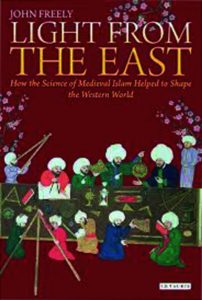
Light from the East: How the Science of Medieval Islam Helped to Shape the Western World
John Freely
IB Tauris
Long before the European Renaissance, while the Western world was languishing in what was once called the “Dark Ages,” the Arab world was ablaze with the knowledge, invention, and creativity of its Golden Age. Through the astrologers, physicians, philosophers, mathematicians, and alchemists of the Muslim world, this knowledge was carried from Samarkand and Baghdad to Cordoba and beyond, influencing Western thinkers from Thomas Aquinas to Copernicus and helping to inspire the cultural phenomenon of the Renaissance. John Freely’s spellbinding story is set against a background of the melting pot of the cultures involved and concludes with the decline of Islam’s Golden Age, which led the West to forget the debt it owed to the Muslim world and the influence of medieval Islamic civilization in forging the beginnings of modern science.
John Freely has written over 40 books and travel guides, most of them about Greece and Turkey. He is author of The Grand Turk, Storm on Horseback, The Cyclades, The Ionian Islands, Crete, The Western Shores of Turkey, Strolling through Athens, Strolling through Venice, and the bestselling Strolling Through Istanbul.
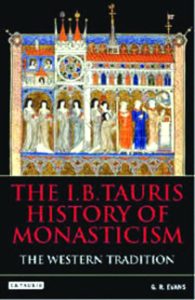
The I.B.Tauris History of Monasticism: The Western Tradition
Book by Gillian Evans
I.B.Tauris (2015)
From the earliest centuries of the church, asceticism and the contemplative life have been profoundly important aspects not just of western Christianity but of western civilization as a whole. For even as monasteries withdrew from the main currents of their societies they provided fertile soil and sanctuary to the liberal arts and sciences as well as those who wanted to spend their lives focused upon God. They became the driving cultural forces of Europe, nurturing education, music, manuscript illumination, art and history, agriculture and animal husbandry – all in addition to spiritual guidance. In this first general history of monasticism in the West since 1900, G R Evans explores the cloistered communities and individuals that have aspired to the ascetic ideal, assessing the huge impact they have made on the wider church and its practices. Including many of the best known names in Christian history – such as Cuthbert, Columba, Hilda of Whitby, Peter Abelard and Thomas Merton – this authoritative survey traces the monastic impulse, in all its rich complexity, from its beginnings in the Egyptian desert up to the present-day ecumenical Taizé community. G.R. Evans is Professor Emeritus of Medieval Theology and Intellectual History at the University of Cambridge, UK.
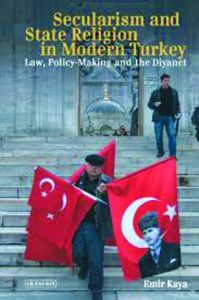
Secularism and State Religion in Modern Turkey: Law, Policy-Making and the Diyanet
Emir Kaya
Bloomsbury Academic
The Diyanet is the ‘Presidency of Religious Affairs’, the official face of Islam and highest religious authority in Turkey, and is a governmental department established in 1924 after the break-up of the Ottoman Empire. In this book, Emir Kaya offers an in-depth multidisciplinary analysis of this vital institution. Focusing on the role of the Diyanet in society, Kaya explores the balance the institution has to strike between the Islamic traditions of the Turkish population and the officially secular creed of the Turkish state. By examining the various laws that either bolstered or hindered the Diyanet’s budgets and activities, Kaya highlights the institutional mindsets of the Diyanet membership as well as evaluating its successes and failures as a governmental department that has to consistently operate within the context of the religiosity of Turkish society. By situating all of this within the context of the two competing—but often complimentary—concepts of religion and secularism, Kaya offers a book that is important for those researching the role of religion and the state in society in the Middle East and beyond.
Emir Kaya is Assistant Professor of Philosophy and Sociology of Law at the Social Sciences University of Ankara. Previously he had worked as a rapporteur judge for the Constitutional Court of Turkey. He holds a PhD in Law from SOAS, the University of London, a Master of Theological Studies from Harvard University, and a Bachelor of Arts in Political Science and Philosophy from Indiana University-Bloomington.


